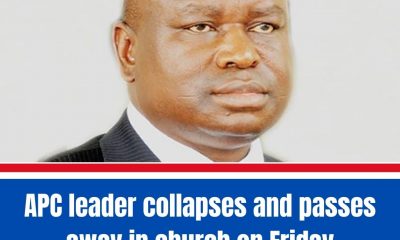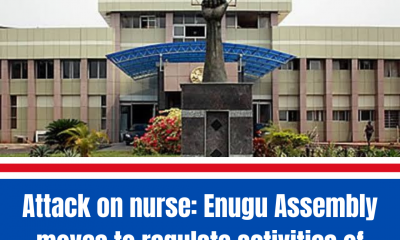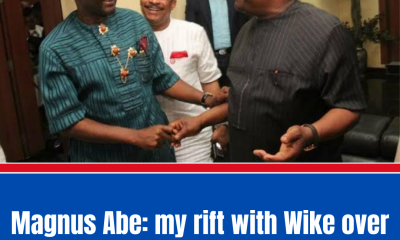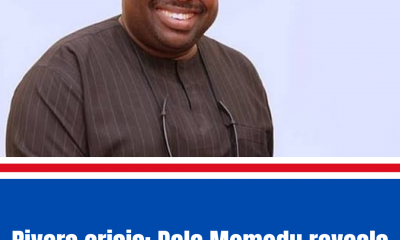Editorial
Abba Kyari: Demise of a power broker

He was the most powerful ‘politician’ in the Buhari administration until last month. He could be described as a top chieftain of the ruling All Progressives Congress (APC). But, it was also clear that his main political party was the President and Commander-In-Chief, Muhammadu Buhari.
He was his bosom friend, confidant, kitchen cabinet member, and pillar of his administration. To him was he also accountable.
Governors and ministers deffered to him for obvious reasons. He wielded enormous influence in the corridor of power. He was somehow kingly in outlook; a resourceful, dedicated and result-oriented public servant. He was active in political work and vibrant in analysis, although his age and physique, on few occasions, made him looked overworked and tired, probably owing to the stress and storm of the high office.
Abba Kyari, the deceased Chief of Staff to President, understood the grammar of administration. It was risky for any actor not to be in his good book. He was bold, brave and highly protective of his advantegeous position.
When he was appointed in August 2015, the announcement drew the envy of party leaders who toiled during the electioneering. They vent their partisan anger in hushed tones. They murmured that Abba Kyari came to reap where he did not sow. But, analysts said that in the presidential system of government, the president is at liberty to appoint anyone into his cabinet.
In the crowd, the bespectacled administrator could always be identified by his white, voluminous native costumes and red cap to match. There were probably some virtues that the president admired in him that were beyond the comprehension of his critics.
That Abba Kyari was an ideologue of socialist bent, as suggested by Foreign Affairs Minister Geoffrey Onyeama, may be news to observers who never shared close ties with him. In the past, many Nigerians who professed socialism and communism as undergraduate students later indulged in primitive accumulation when they got to government. But, the point of departure was that Abba Kyari was poles apart from those who flaunted their wealth.
Politically, there was no evidence to show that he came across as a man of the people. He was not a public idol. He was not a kingmaker before 2015. He was only a beneficiary of power by the grace of friendship and favour. The former chief of staff was also a victim of social media venom, especially unethical online elements who deluded themselves into thinking that they practiced journalism, although they merely engaged in subjective pseudo-advocacy.
But, in all these, what mattered to the president was that Abba Kyari justified the confidence he reposed in him.
The successful lawyer, journalist and boardroom guru was a technocrat in government before his career was terminated by pestilence. On March 29, he announced that he tested positive for Covid-19. He may have contacted the dreaded disease, following his trip to Germany, where he negotiated with relevant agencies on how to fix the power sector.
He was moved to Lagos for treatment. The place of treatment was concealed. Information and Culture Minister Alhaji Layiwola Mohammed said it was his personal affair. Those who came in contact with the chief presidential aide, particularly governors and ministers, immediately went into isolation.
They also submitted themselves to test. The results were negative. Therefore, when there was no news about Abba Kyari, anxiety hieghtened. Shortly after, on his sick bed, he was optimistic that he would be back in office soon. But, he never returned alive. He was buried in Abuja at the weekend. It was the end of an era.
Abba Kyari’s demise should raise awareness about the global emergency and remind all and sundry that Covid-19 pandemic is no respecter of persons, class or distinction. The dreaded disease is real. Nigerians should stay or play safe by complying with directives on the lockdown and social distancing. Prevention is better than cure.
The departed Chief of Staff was geuinely mourned by his boss. His colleagues at the Federal Executive Council (NEC), presidential staff, leaders of the ruling and opposition parties, politicians, family members and indigenes of his native Borno also paid their tributes.
Abba Kyari left behind a trembling and bewildered country grappling with Coronavirus pandemic in the face of a decayed health sector; a polity ravaged by corruption which is usually fighting back, and a people agonising under the yoke of a wobbling economy, dilapidated infrastructure and illusion of hope.
As from this week, the scramble to fill the vacant slot his death has created will kick off. Since nature abhors a vacuum, many chieftains, associates, friends and relations of the president will be jostling for the vacant position. Who succeeds Abba Kyari?
The former Chief of Staff was brilliant, articulate and witty. Although he may have ruffled feathers as the eye and ear of his boss, the president perceived him as a dependable ally and loyalist. Thus, all complaints against him about personalisation of power and peculiar arrogance were ignored by the Chief Tenant of Aso Villa, the seat of power.
When Abba Kyari was appointed Chief of Staff, his contribution to the presidential campaign that brought the Daura-born General to the highest office was not public knowledge, beyond the general acknowledgment of personal friendship.
But, the volley of criticisms against him did not abort his reappointment last year for a second term. Since then, he had waxed stronger in the APC government.
Some commentators even referred to him as the defacto president, who really held forte when the Commander-In-Chief was abroad. It is common knowledge that the vice president under the presidential system is a dignified spare tyre.
Abba Kyari’s predecessors in office are Brig-Gen. Jones Arogbofa, Mike Oghiadome and Gen. Abdullahi Mohammed. None of them was as powerful and daring as the Kanuri power broker. While they chose to work behind the scene, the Borno kingpin was highly visible, having been catapulted to the front burner by presidential privilege, diligence and trust. He was not elected. But, he was the lone and exclusive route to the presidency. On many occasions, the fear of Abba-Kyari was the beginning of wisdom.
Highly educated, Abba-Kyari knew his onions. He was an alumnus of both the University of Warwick and University of Cambridge, both in the United Kingdom. He earned a bachelor’s degree in Sociology from Warwick and a Law degree in 1983 from Cambridge.
He was called to the Nigerian bar in 1984 after attending the Nigerian Law School.
Later, he attended the International Institute for Management Development in Lausanne, Switzerland in 1992. He also participated in the Programme for Management Development at the Harvard Business School in 1994.
He worked for the law firm of Fani-Kayode and Sowemimo after Law School. Between 1988 and 1990, he was Editor with the New Africa Holdings Limited Kaduna. In 1990, Abba Kyari served as a Commissioner for Forestry and Animal Resources in Borno State. From 1990 to 1995, he was the Secretary to the Board of African International Bank Limited, a subsidiary of Bank of Credit and Commerce International.
He was also an Executive Director in charge of Management Services at the United Bank for Africa (UBA). Later, he was appointed the Chief Executive Officer of the bank. In 2002, Abba Kyari was appointed a Director of Unilever Nigeria. He also later served on the board of ExxonMobil Nigeria.
His decision to join the private sector as against the advice to join the Army paid off for him.
Narrating the challenge of choosing a career option, Kyari said that after leaving St. Paul’s College, Wusasa, Zaria, his friend, Dr. Ibrahim Tahir, and Mallam Mamman Daura, his mentor, urged him to join the Army. But he declined.
However, in Septembet 1974, he applied to the then Cambridge Tech for his Advanced Levels at a time Tahir was writing his doctoral thesis in Cambridge University, London. That, in his view, marked the beginning of his journey to tertiary institution. She would later marry his wife, Kulu, who is Tahir’s sister-in-law.
As President Buhari’s dependable aide, he was the door to the Commander-In-Chief. As the gate-keeper, all requests for meetings with the president were channelled through him. He would not allow any photo opportunity to elude him at the Villa.
He was on collision course with some top government officials, including the former Head of Service, Mrs. Winifred Oyo-Ita, who was later sacked, the Security Adviser, Gen. Babagana Monguno, who directed service chiefs to stop taking orders from him, and the wife of the president, Mrs. Aisha Buhari, who cried out that her husband had been hijacked and held hostage by some cabals.
Such controversies were the lot of many Chiefs of Staff in this dispensation, particularly at the state level, where critics saw them as power barons. They were the closest to their governors who reposed much confidence in their abilities. Commissioners, Special Advisers, lawmakers and party stalwarts used to envy them. Many have occupied the pre-eminent positions and rode on their backs to stardom. They include Mohammed and Babatunde Fashola (Lagos), Nyesom Wike (Rivers), Yemi Adaramodu (Ekiti) and Pius Onoja (Kogi).
Abba Kyari was believed to have maintained an uncanny fidelity to the president to the end. Unlike 2015, he campaigned for the president’s re-election in 2019. Paying tribute to him, the former governor of Borno State, Senator Shettima Kasim, said: ”Hate him or love him, you cannot query his loyalty to the President.”
He was said to be controversial, although he never allowed himself to be drawn out in any media war. He was always cautious, refraining from speaking to the media on controversial issues, but allowing presidential spokesmen to defend his integrity.
When it was alleged that he was involved in bribery, presidential aides dismissed it as a ruse, explaining that a dutiful Chief of Staff, who rejected a N200 million monthly allocation to his office could not have indulged in graft. In his tribute, President Buhari said he shared the vision of anti-corruption.
On Saturday, Garba Shehu also echoed the president’s remark about the late Chief of Staff. He described him as the most misunderstood Nigerian, adding that he was honest and loyal.
Eyebrows were raised at the appointment of Aisha, his daughter, as a Special Assistant to in the Nigerian Sovereign Investment Authority (NSIA). Critics said he influenced it. But, the agency explained that the appointment followed a rigorous process devoid of bias, sentiment and preferential treatment. However, many chided him for kleptocracy when it was alleged that he put his name on the board of the Nigerian National Petroleum Corporation (NNPC).
Until his death, many believed that he would be among the key players in the 2023 succession agenda, after the expiration of the second term of President Buhari.
A recipient of the Officer of the Order of Niger (OON), Abba Kyari is survived by his wife, Kulu, two sons and two daughters.
-

 Politics6 days ago
Politics6 days agoAPC leader collapses and passes away in church on Friday
-

 News3 days ago
News3 days agoFake Reverend Sister Arrested With 38 Children
-

 News5 days ago
News5 days agoAttack on nurse: Enugu Assembly moves to regulate activities of masquerades
-

 Gist1 day ago
Gist1 day agoMy Boss Used To ‘KNACK’ My Wife After Sending Me On A Mission, To The Extent She Got… – Ex-soldier
-

 News6 days ago
News6 days agoLocal Content, Local Fraud
-

 News7 days ago
News7 days agoCourt awards N10m damages against EFCC for ‘unlawful’ publication against Christ Embassy Pastor Miebi Bribena and wife
-

 Politics5 days ago
Politics5 days agoMagnus Abe: my rift with Wike over
-

 Politics5 days ago
Politics5 days agoRivers crisis: Dele Momodu reveals cause of fight between Wike, Fubara




